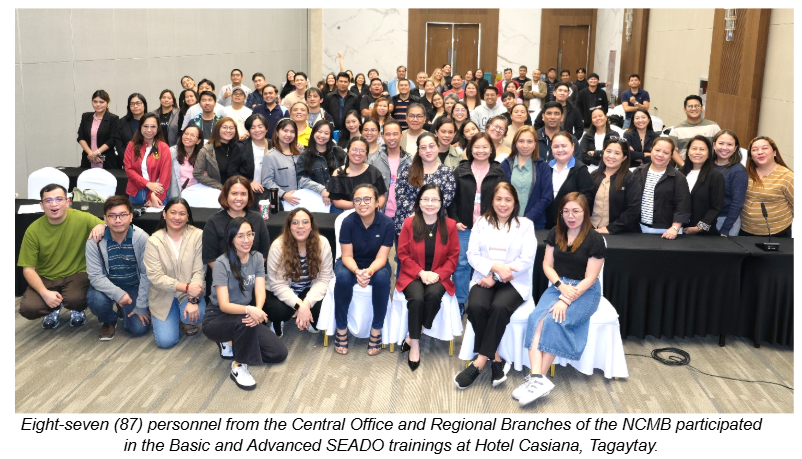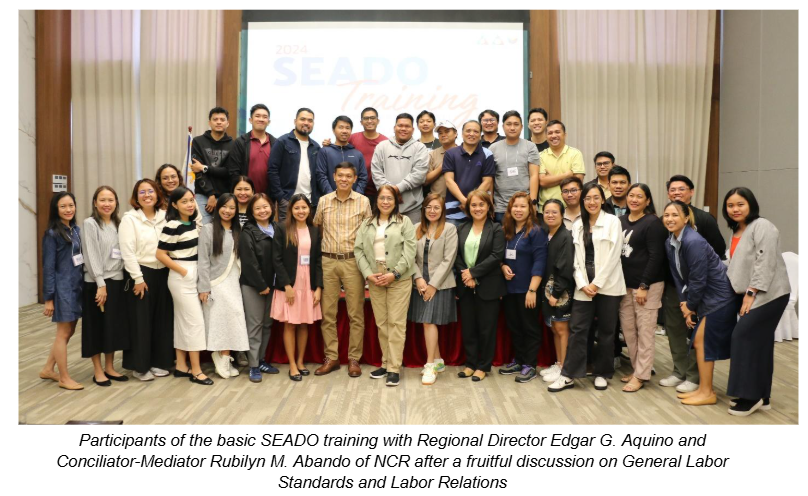 Tagaytay City, Cavite – “Seek guidance. Be optimistic, patient, and persevere,” emphasized Executive Director Maria Teresita D. Lacsamana-Cancio of the National Conciliation and Mediation Board (NCMB) during the culmination of the Basic and Advanced Trainings for its Single-Entry Assistance Desk Officers (SEADOs) from November 11-15 2024 at the Hotel Casiana, Tagaytay, Cavite. Her message served as a powerful reminder that the success of the Single-Entry Approach (SEnA) Program of the Department of Labor and Employment (DOLE) rests upon the diligence and unwavering commitment of its implementers, the SEADOs, in resolving labor conflicts and maintaining harmonious workplace relations.
Tagaytay City, Cavite – “Seek guidance. Be optimistic, patient, and persevere,” emphasized Executive Director Maria Teresita D. Lacsamana-Cancio of the National Conciliation and Mediation Board (NCMB) during the culmination of the Basic and Advanced Trainings for its Single-Entry Assistance Desk Officers (SEADOs) from November 11-15 2024 at the Hotel Casiana, Tagaytay, Cavite. Her message served as a powerful reminder that the success of the Single-Entry Approach (SEnA) Program of the Department of Labor and Employment (DOLE) rests upon the diligence and unwavering commitment of its implementers, the SEADOs, in resolving labor conflicts and maintaining harmonious workplace relations.
The training initiatives brought together the technical and administrative personnel from the Central Office and 16 Regional Branches making the interplay and interaction more insightful and productive.
During the Basic Training, Deputy Executive Director Teresita E. Audea discussed and provided an in-depth overview of the SEnA Program, highlighting its development, legal framework, and the governing guidelines for its implementation. Her presentation stressed the importance of the SEnA Program’s crucial role in upholding industrial peace by providing accessible, inexpensive and non-litigious approach to settlements of labor disputes.
The first half of the second day featured topics on labor concepts, standards and relations. The morning session centered on General Labor Standards as discussed by Director Edgar Aquino of NCR. The discussion focused on workers’ statutory monetary benefits, including computation of compensations for holidays, overtime, nightshift workhours, leave benefits, among others. He also briefly discussed concerns involving special group of workers such as Kasambahays, security guards, construction workers, and riders. Collaborative learning was evident throughout the training as participants, especially those with background in labor inspection, eagerly shared their knowledge and experiences related to these concerns.
In the afternoon, Conciliator-Mediator Rubilyn M. Abando discussed the topics on Labor Relations. She delved into the complex nature of employer-employee relationships, as well as determination of employment status. The session included real-life case examples in order to help participants gain deeper understanding of the concepts and their practical application.
DED Audea concluded the second day with a discussion on Conciliation-Mediation Process and Behavioral Skills and Requirements of a SEADO. She underscored the interplay of the basic conciliation mediation process and the key skills and behaviors that each SEADO should possess and develop to effectively settle issues.

The third day began with discussion on the techniques in writing minutes and agreements by IV-B Regional Director Ligaya R. Lumbay. She stressed the importance of ensuring that the contents of the minutes and agreements are simple, concise and understandable to the parties concerned as the primary readers and users of these documents. The basic training concluded with the participants demonstrating their learnings through a mock conciliation mediation followed by cliniquing from the facilitators and fellow participants.
The afternoon program shifted to higher gear with the arrival of additional batch of participants for the Advanced Training.
OIC-Chief Ianne R. Go of the Research and Information Division provided an overview and walkthrough of the Single-Entry Approach Information System (SENA IS). Through a hands-on exercise, OIC-Chief Go guided the participants on how to navigate the platform. The discussion was enriched with the sharing of experiences and the issues encountered by the staff in the pilot testing of the system.
Director Othello Tongio Jr. of Regional Branch III started the fourth day with the topic, “A, B, or C: Choosing the Best Option,” teaching the participants on how to generate options, including critical factors to consider for effective negotiations in settling labor disputes.
The afternoon session was dedicated to the topic discussed by Director Lumbay, “Getting a Yes: The Power of Persuasion,” as she enumerated different strategies and techniques of influencing the parties consider the best option. The session wrapped-up with another mock conference; and participants were asked to observed and provide their insights regarding the techniques applied in the workshop.
On the fifth day, Labor and Employment Officer Eloisa Mae M. Aquino of the Conciliation and Mediation Division began with a discussion on the SEnA forms and reportorial requirements. The final session of the program was dedicated on the discussion of issues and concerns in the implementation of SEnA, facilitated by DED Audea. In the session, participants were able to share their experiences in handling requests-for-assistance (RFAs) in their respective regions while showcasing their best practices to address the issues they faced during implementation.
The event culminated with the awarding of certificates of completion to eighty-seven (87) dedicated personnel of the NCMB.
The SEADO training is one of the initiatives of NCMB, as the program manager and secretariat of the SEnA Program of DOLE, to ensure that the skills and knowledge requirement of the handling officers is attained to effectively deliver conciliation-mediation services.
For more information about this article, email cmd_co@ncmb.gov.ph or call (02) 8252-6262 loc. 745.
end/smsm






 Views Today : 503
Views Today : 503 Total views : 607039
Total views : 607039

